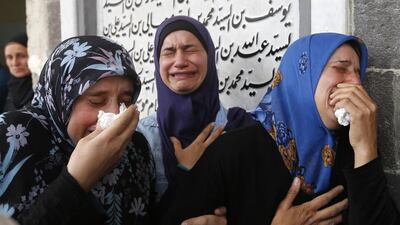BEIRUT // While evacuation deals in Syria have seen thousands of cornered, starving fighters and civilians moved to relative safety during the war, their chief aim is not to reduce suffering.
To the world, such deals and population exchanges create the impression that despite how bitterly divided the country’s rebels and government forces are, there is perhaps some hope for negotiation and compromise.
But such deals have largely benefited the battlefield goals of Damascus, and merely fit within the strategic fabric of a war where brutal sieges – blatantly used by both sides – have become accepted tactics.
“The deals are not by any means a genuine attempt at alleviating suffering,” said Lina Khatib, head of the Middle East and North Africa programme at the London-based think tank Chatham House.
“Anti-regime populations that have accepted the deals have in effect accepted surrender to the regime because they have no other choice in the absence of a settlement to the Syrian conflict and of real support by the international community to the Syrian opposition.”
The majority of evacuations over the past year have seen rebels – surrounded, outgunned and far from reinforcements – agree to leave their areas instead of face annihilation.
Damascus has used these deals to force the rebels into Idlib province – the last large area of the country held by opposition who are still committed to fighting the government – to be dealt with later while avoiding costly battles in the interim.
“[Evacuation deals are] not peace on equitable terms, they’re another tactic the regime has deployed to secure victory, although, on net, they may have some humanitarian benefit for local civilians,” said Sam Heller, a Syria analyst at the Century Foundation, a New York-based think tank.
Last week, the first phase of Syria’s largest population transfer deal to date ended with 8,000 residents departing the besieged pro-government towns of Fuaa and Kafraya in Idlib province, and 3,000 people leaving the rebel holdouts of Zabadani and Madaya near the Lebanese border. The four-town deal aims to relocate a total of 30,000 people over two months, with Fuaa and Kafraya residents going to government-held areas of the country and Zabadani and Madaya residents going to Idlib province.
Fuaa and Kafraya have been besieged by rebel forces for more than two years – and Zabadani and Madaya have been besieged by pro-government fighters for even longer.
For now, the evacuation deal remains fragile and there are groups that will try to play a spoiler role.
In December when a deal was cut to evacuate sick and injured civilians from Fuaa and Kafraya in return for the evacuation of civilians and fighters trapped in eastern Aleppo, buses sent to the Shiite villages were attacked and burnt by gunmen. The evacuation of rebel areas of Aleppo was quickly, albeit temporarily, halted.
Again, when the evacuation of Fuaa and Kafraya got under way on April 16, a massive bomb struck buses carrying civilians out of the towns, killing 130 people. No group has yet claimed responsibility for the attack.
While the latest evacuation deal is more equitable than others in the conflict, it still has huge strategic implications.
It continues to move the regime’s enemies into Idlib as well as pave the way for a long awaited offensive on the province.
Fuaa and Kafraya represent the last bargaining chips the rebels and extremists in Idlib have. The two towns and their residents have been hostages of these fighters, allowing them to negotiate with the regime and stave off attacks by threatening harm to the government’s supporters.
But once – or if – these towns are evacuated, the rebels and extremists will lose their leverage. With the towns safely emptied, the government and its allies will have little reason not to mount a full-on attack on Idlib. A government assault on the province was always inevitable at some point, however, and the opposition likely felt faced with no good options when agreeing to the evacuation deal.
Idlib is a place where extremist and hardline groups have gained dominance, and where more moderate rebel groups are quickly subjugated or absorbed by the extremists.
When the Syrian government finally attacks Idlib, it will likely hope that this makes its assault more palatable to the international community.
And even if civilians make it out of Zabadani and Madaya, they may quickly find themselves under attack again in Idlib.
jwood@thenational.ae
* With additional reporting from Associated Press

